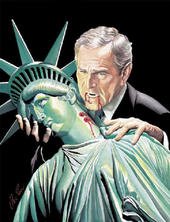 As if we arrived through the blind extremes
As if we arrived through the blind extremesof sleep, we opened our mouths, eyes closed,
and the priest laid on our tongues his coins
of bread, what we learned never to cross
with our teeth, never to rush, for at the heart
of each was God's nerve, burning and alive.
Then we washed it down with wine and Latin—
cruor dei, God's blood, the stuff I figured
flowed in everyone's body—what did I know—
though here was the glad horror of appetite
taking it in, and memories of other gods,
how they in their stories were torn apart,
exploding into the ten thousand things,
into the still-conscious body of names
for things, with every word a hint of blood.
It's how I picture crowning into the world—
through red water over rims of bone
into a little chaos of lights and gasping.
I like to think the blade binds as it cuts,
mother from child, that each solitude
ripens into a name for the other.
And as the mother looks down, her voice
is a braid of scar tissue between them.
It draws the child further into debt
he never resolves, not wholly, but sees
in the unlikely bodies of passersby,
in the man, say, caught on film, who keeps
bending back the car door, pulling a stranger
from a seat on fire—a birth of sorts,
though none is entirely his to repay.
It's only the trace, at best, a kindness
remade the way gods remake themselves
in our image, half-naked, their hands nailed
to some bare wall in sweltering Texas.
Their feet are vines crossing in the brick shade.
They would turn us all into mothers, grieving.
And among our children: debt and hunger.
Sometimes you feel them thinking, confiding
in the barely audible speech of twins.
In bad times they almost sound like hope.
Which they are. So many cuts, so many streams
of erotic letters welling up in the rift:
a lover says goodbye in the hazard lights
of an idling taxi, a pulse in the eye
she will never quite remember nor forget,
not completely, and to live just this side
of completion is to turn further inward
the way a key of light turns in a gaze.
So it is with my father in his illness,
railing at the bolted apartment door,
cursing his wife for locking up his wife.
Or swearing he is the doctor again
with patients enthralled in another room.
He is the complicated child, the latch
lifting on an intricate cage. He scissors us
into broken flocks of memory and wish
which are his own body tearing apart,
though it is tough to say he suffers
the knowledge, our sense of what he was
or will be. It could be kindness too:
the bony dice of days stumbling through him,
the bewildering children who hold out
their shadowy bruises, too young to know
which wounds are serious—they all seem so
early on—and which ones simply clear up
with time, going clean in their own blood.
...by Bruce Bond
Reprinted with permission from
The Thoats of Narcissus
Copyright (c.) 2001 by Bruce Bond
University of Arkansas Press










